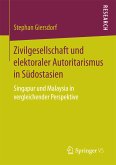The democratization of a national government is only a first step in diffusing democracy throughout a country's territory. Even after a national government is democratized, subnational authoritarian 'enclaves' often continue to deny rights to citizens of local jurisdictions. Gibson offers new theoretical perspectives for the study of democratization in his exploration of this phenomenon. His theory of 'boundary control' captures the conflict pattern between incumbents and oppositions when a national democratic government exists alongside authoritarian provinces (or 'states'). He also reveals how federalism and the territorial organization of countries shape how subnational authoritarian regimes are built and how they unravel. Through a novel comparison of the late nineteenth-century American 'Solid South' with contemporary experiences in Argentina and Mexico, Gibson reveals that the mechanisms of boundary control are reproduced across countries and historical periods. As long as subnational authoritarian governments coexist with national democratic governments, boundary control will be at play.
Dieser Download kann aus rechtlichen Gründen nur mit Rechnungsadresse in A, B, BG, CY, CZ, D, DK, EW, E, FIN, F, GR, HR, H, IRL, I, LT, L, LR, M, NL, PL, P, R, S, SLO, SK ausgeliefert werden.









